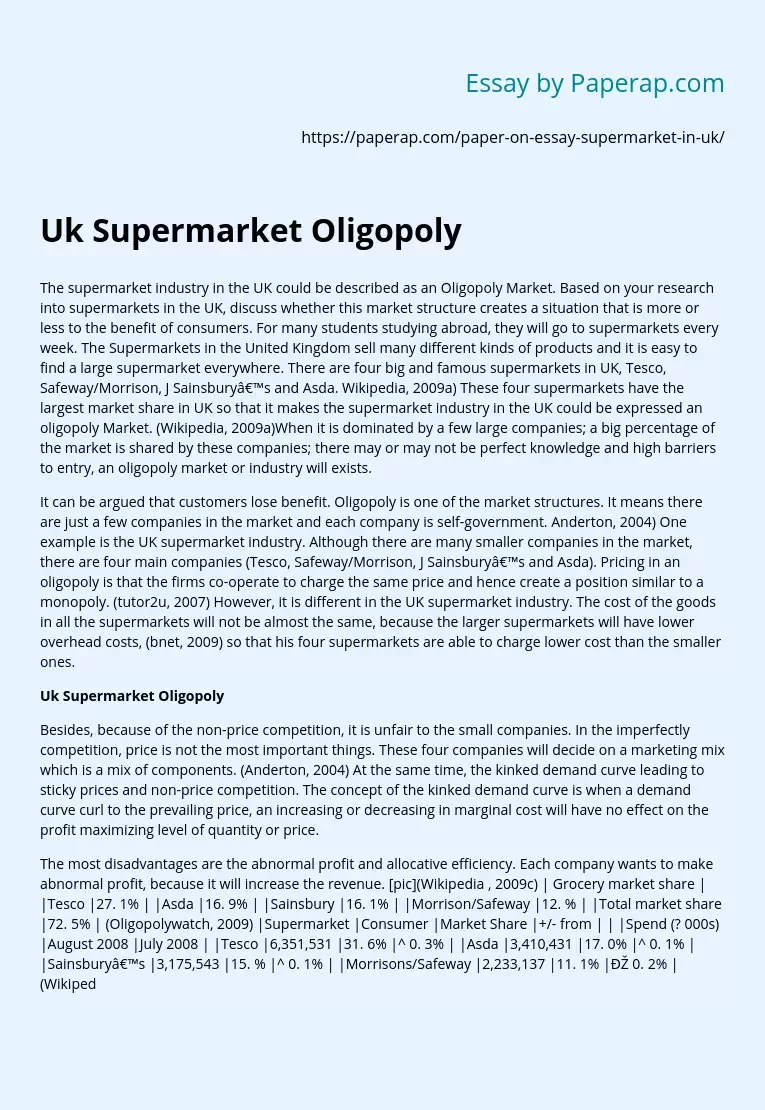Uk Supermarket Oligopoly
The supermarket industry in the UK could be described as an Oligopoly Market. Based on your research into supermarkets in the UK, discuss whether this market structure creates a situation that is more or less to the benefit of consumers. For many students studying abroad, they will go to supermarkets every week. The Supermarkets in the United Kingdom sell many different kinds of products and it is easy to find a large supermarket everywhere. There are four big and famous supermarkets in UK, Tesco, Safeway/Morrison, J Sainsbury’s and Asda.
Wikipedia, 2009a) These four supermarkets have the largest market share in UK so that it makes the supermarket industry in the UK could be expressed an oligopoly Market. (Wikipedia, 2009a)When it is dominated by a few large companies; a big percentage of the market is shared by these companies; there may or may not be perfect knowledge and high barriers to entry, an oligopoly market or industry will exists.
It can be argued that customers lose benefit. Oligopoly is one of the market structures. It means there are just a few companies in the market and each company is self-government. Anderton, 2004) One example is the UK supermarket industry.
Although there are many smaller companies in the market, there are four main companies (Tesco, Safeway/Morrison, J Sainsbury’s and Asda). Pricing in an oligopoly is that the firms co-operate to charge the same price and hence create a position similar to a monopoly. (tutor2u, 2007) However, it is different in the UK supermarket industry. The cost of the goods in all the supermarkets will not be almost the same, because the larger supermarkets will have lower overhead costs, (bnet, 2009) so that his four supermarkets are able to charge lower cost than the smaller ones.
Uk Supermarket Oligopoly
Besides, because of the non-price competition, it is unfair to the small companies. In the imperfectly competition, price is not the most important things. These four companies will decide on a marketing mix which is a mix of components. (Anderton, 2004) At the same time, the kinked demand curve leading to sticky prices and non-price competition. The concept of the kinked demand curve is when a demand curve curl to the prevailing price, an increasing or decreasing in marginal cost will have no effect on the profit maximizing level of quantity or price.
The most disadvantages are the abnormal profit and allocative efficiency. Each company wants to make abnormal profit, because it will increase the revenue. [pic](Wikipedia , 2009c) | Grocery market share | |Tesco |27. 1% | |Asda |16. 9% | |Sainsbury |16. 1% | |Morrison/Safeway |12. % | |Total market share |72. 5% | (Oligopolywatch, 2009) |Supermarket |Consumer |Market Share |+/- from | | |Spend (? 000s) |August 2008 |July 2008 | |Tesco |6,351,531 |31. 6% |^ 0. 3% | |Asda |3,410,431 |17. 0% |^ 0. 1% | |Sainsbury’s |3,175,543 |15. % |^ 0. 1% | |Morrisons/Safeway |2,233,137 |11. 1% |Ў 0. 2% | (Wikipedia, 2009b) One advantage for customers is the ‘price wars’. In a oligopoly market, the price will be change by few companies; however, the firms will compete on price, so that they can become a Price maker and attract a larger market share optimistically. The UK supermarkets show this by having ‘price wars’, (guardian. co. uk, 2009) where one supermarket announces a range of price cuts in its products and the others follow.
The British supermarket is may be heading to a death match between the two leaders: Tesco and Asda. (Oligopolywatch, 2003) These two biggest supermarkets break out price wars again and again. (guardian. co. uk, 2009) No matter cut down the price of mike (TIMES ONLINE, 2009) or the price of grocery, the finally objective is to own the market share and make the biggest profit. However, these features of price fixing and yet competing on price can be explained by the kinked demand curve theory. Above the market price (P0) the demand curve is elastic.
This means that if one firm raised its prices, to P1, it would lead to a fall in total revenue, and so other firms will not follow. Below the market price the demand curve is inelastic, so if a firm lowers its price the others will be forced to follow, leading to Price wars and a loss of revenue all round. The market price is probably reached, because all the companies conspire with each other. In view of the fact that change the price will result in the total revenues, firms do not need to change prices so that the companies can fix a price as they want. It will make them earn the maximum profit in the long run.
Other advantages for the customers are international competition, innovate, economic of scale and research and development. In these four actions, oligopoly will give customers benefits which will attract more consumers. In conclusion, there are both advantages and disadvantages of UK supermarket industries for customers. What is the most important is the price. The market structures of oligopoly market affect the price. For the government, the most important things is to prevent oligopoly market and keep the perfect competition. Reference:
• Wikipedia (2009a) [Online], Supermarkets in the United Kingdom.
Uk Supermarket Oligopoly. (2019, Dec 05). Retrieved from https://paperap.com/paper-on-essay-supermarket-in-uk/

